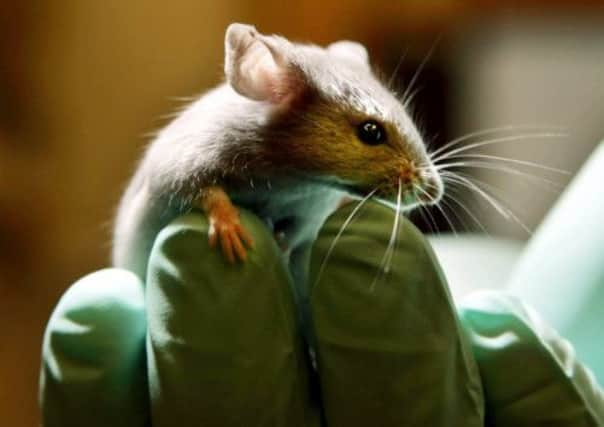Scottish GM animal experiments increase


The use of GM animals – bred with DNA altered for testing – rose by nearly a third and made up nearly half of all lab animals used in Scotland. There was also a sevenfold increase in the use of monkeys since 2011.
The figures obtained by the British Union for the Abolition of Vivisection (BUAV) also show a total of 623,194 animals were used in tests at universities and commercial facilities north of the Border in 2012, a decrease of more than 3 per cent on the previous year.
Advertisement
Hide AdAdvertisement
Hide AdThe Scottish figures buck the UK trend, which saw a 9 per cent rise in the overall number of animals used in tests but a more modest increase in the use of animals bred to possess specific human genes.
The UK increase comes despite a commitment in the coalition agreement between the Tories and Lib Dems in 2010 to reduce the use of animals in scientific research, and ahead of legislation that came into force in January, strengthening a European Union directive.
Scientific studies last year in Scotland also used more dogs and rabbits than in 2011 – an increase of 62.5 per cent and 35 per cent respectively – as well as more than 12,000 animals with a harmful genetic mutation.
Researchers at Scottish universities experimented on seals, rabbits, hamsters, guinea pigs, cattle, sheep, pigs, mice and rats as part of medical research into the effects of disease, pollution, diet and stress, but there is an increasing move towards replacing live testing with computer models and sophisticated cell culture systems.
Michelle Thew, chief executive of the BUAV, said: “Any decrease in the numbers of animals used in research is welcome. However, hundreds of thousands of animals continue to suffer and die in Scottish laboratories every year.
“In particular, we are alarmed to learn that during 2012 there were sharp increases in the numbers of genetically modified animals, primates and dogs used. We need to see meaningful and lasting changes for animals in laboratories.”
A spokesman for Dundee University said all scientific procedures involving animals must be passed by its ethical review committee, which includes a vet, and all work is closely monitored and carried out under Home Office licences.
“Animals are used for research only in instances where no alternatives are available,” he said. “The results of these studies are of great importance in better understanding and developing treatments for serious health problems, including Alzheimer’s, Parkinson’s disease, cancer, heart disease, diabetes, genetic disorders and infectious diseases.
Advertisement
Hide AdAdvertisement
Hide Ad“The university takes its ethical and legal responsibilities very seriously. All our work is carried out in accordance with the three Rs concept: reduction in the number of animals used, refinement of procedures so the least possible harm is done in collecting information, and the replacement of animals with other research methods wherever possible.”